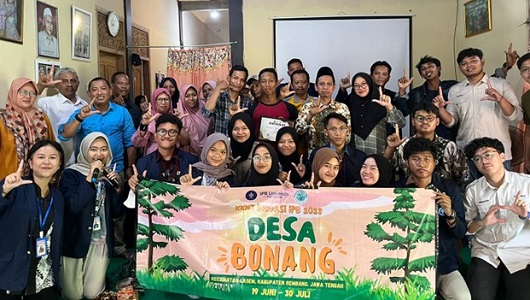IPB University Innovation KKN-T Students in Bonang Village Education on Irrigation Systems and Pest Problems

IPB University Real-Thematic Work Lecture (KKN-T) Innovation students held counseling and education activities on irrigation systems and pest problems at the house of the Chairman of the Association of Farmers Groups (Gapoktan) Bonang Village, Lasem District, Rembang Regency, Central Java. Agricultural extension activities were attended by village officials, the Agricultural Extension Agency (BPP) and members of farmer groups.
The counseling aims to provide education and understanding to farmers regarding effective irrigation systems to apply and how to deal with planthopper pests by introducing biological agents. This program was accompanied by Nadzirum Mubin, SP, MSi as a Field Assistant Lecturer for KKN-T Innovation as well as a Coordinating Lecturer for the Rembang Region.
"The majority of the people of Bonang Village make a living as fishermen. However, during the rainy season the people tend to farm. It is hoped that IPB University's KKN-T Innovation students can change the behavior of farmers in Bonang Village through the innovations presented and hopefully they can absorb their knowledge well," said Farmi, a representative of BPP Lasem District who was present at the event.
IPB University KKN-T Innovation Village Coordinator (Kordes), Azizul Hakim said there were two main agricultural problems in Bonang Village, namely drought and planthopper pest disturbances. IPB University KKN-T Innovation students compiled a program in the form of counseling related to the use of the biological agent Lecanicillium lecanii to deal with planthopper pests that attack rice plants. In addition, there is counseling to introduce drip irrigation to agriculture in Bonang Village.
“We introduced a drip irrigation system. This irrigation method can save water and it is suitable for use on land that often experiences drought. The way it works is fairly easy, namely by flowing water near each plant through a pipe and a series of drippers, letting the water drip slowly to the roots of the plants," Aziz explained.
This method, he said, is usually applied to horticultural crops because apart from being able to save time it can also produce better yields. However, it is necessary to take care of the dripper holes which are quite small because they are prone to clogging. IPB University KKN-T Innovation students also showed a demonstration video of the drip irrigation itself to increase farmers' understanding.
In their presentation, students mentioned the causes of the explosion of planthopper pests, the biological control system in rice to deal with planthopper pests and how to control them by using a biological agent in the form of Lecanicillium lecanii. "Lecanicillium lecanii is a fungus that belongs to the entomopathogenic group which has a fairly wide host range and is cosmopolitan," said Aziz.
After providing theoretical understanding to the socialization participants, IPB University students demonstrated how to propagate the biological agent Lecanicillium lecanii using rice. In addition, students also introduced insect monitoring techniques using yellow sticky traps and pheromone traps for fruit flies, namely petrogenol.
The counseling activity was positively welcomed by Gapoktan members in Bonang Village and BPP Lasem. Through this activity it is hoped that it will be able to provide solutions to overcome planthopper pests and drought problems in Bonang Village. (*/Rz) (IAAS/Hap)



